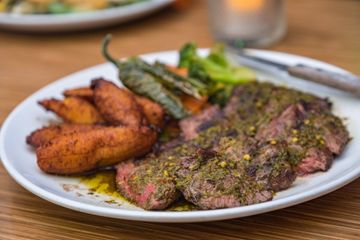Is Mexican Food Healthy And Balanced? Unboxing the Nutritional Advantages of Standard Active Ingredients
The question of whether Mexican food is healthy and balanced welcomes an expedition of its traditional ingredients. Beans and corn work as foundational staples, abundant in healthy protein and fiber. Avocados provide valuable fats, while various natural herbs and spices add flavor and health benefits - happy hour. With each other, these parts produce a tapestry of nourishment. The healthfulness of Mexican food frequently depends on preparation approaches and part dimensions. What function do these aspects play in establishing its total dietary worth?
The Power of Beans: Healthy Protein and Fiber-Rich Staples
Although often overlooked, beans function as a foundation of Mexican cuisine, providing a riches of nutritional benefits. Rich in protein, they are an outstanding plant-based option for those seeking to satisfy their dietary healthy protein requires. This high protein content sustains muscle mass repair and growth, making beans very useful for both vegetarians and meat-eaters alike. Additionally, beans are an extraordinary source of dietary fiber, which assists in food digestion and advertises a feeling of volume, possibly aiding with weight administration.
The range of beans used in Mexican recipes, such as black beans, pinto beans, and kidney beans, adds to a varied flavor account and can improve dishes nutritionally. Beans are low in fat and include essential vitamins and minerals, consisting of magnesium, iron, and folate. Together, these attributes make beans a vital ingredient, supplying both nutrition and food in conventional Mexican fare.

Corn: a Versatile Grain With Nutritional Advantages
Corn stands apart as a flexible grain basic to Mexican food, commemorated not only for its culinary applications however likewise for its excellent nutritional profile. As a main component in dishes like tortillas, tamales, and pozole, corn offers essential nutrients that contribute to a well balanced diet. Rich in carbohydrates, it functions as a considerable power resource, while also being low in fat, making it a positive alternative for numerous nutritional demands.
Corn is a good resource of nutritional fiber, which assists in food digestion and advertises satiety. It includes considerable quantities of vitamins such as B-complex vitamins, which are crucial for basal metabolism. The existence of anti-oxidants, especially carotenoids, adds to overall wellness by minimizing oxidative stress and anxiety. In addition, corn is gluten-free, satisfying those with gluten sensitivities. Overall, the dietary advantages of corn highlight its significance in traditional Mexican food and its function in a healthy diet.
Avocados: Healthy Fats and Nutrients in Every Bite
Avocados play a significant duty in Mexican food, matching recipes with their luscious appearance and rich flavor. Past their cooking appeal, avocados are commemorated for their remarkable dietary account. They are an abundant source of healthy and balanced monounsaturated fats, which can aid reduced poor cholesterol levels and support heart health. In addition, avocados are packed with essential nutrients, including potassium, vitamin E, and B vitamins, adding to general health.
The high fiber content in avocados help digestion and advertises satiety, making them a valuable addition to any kind of meal. Their one-of-a-kind nutrient make-up can also sustain skin health and supply anti-inflammatory benefits. Integrating avocados into conventional Mexican recipes or appreciating them as a standalone treat can boost both taste and nutrition, demonstrating why they are a precious staple in Mexican cuisine. Generally, avocados offer a delicious method to enjoy healthy fats and crucial nutrients in every bite.

Herbs and flavors: Flavorful Wellness Boosters
While delighting in the rich tastes of Mexican food, one can not overlook the important function that spices and natural herbs play in enhancing both preference and health. Active ingredients such as oregano, cilantro, and chili peppers not just add to the lively flavor account however likewise supply substantial wellness benefits. Cilantro is recognized for its detoxifying residential properties, assisting to remove heavy metals from the body, while oregano is packed with anti-oxidants and possesses anti-inflammatory impacts.
Chili peppers, a staple in numerous Mexican recipes, include capsaicin, which has actually been linked to enhanced metabolism and discomfort alleviation. Additionally, seasonings like cumin and coriander support food digestion and might assist in blood sugar level guideline. Integrating these tasty health and wellness boosters right into meals not only boosts the cooking experience however also promotes overall wellness, making Mexican cuisine not simply scrumptious, but likewise nutritionally helpful.
Conventional Food Preparation Techniques: Enhancing Nutrition and Flavor
Traditional cooking techniques in Mexican food play an important function in improving both nutrition and flavor, as they frequently focus on time-honored strategies and fresh components. Strategies such as nixtamalization, where corn is saturated and cooked in an alkaline remedy, not only enhance the nutrient account of tortillas however likewise improve their digestibility - mexican food. Additionally, using slow-moving food preparation techniques, like cooking or braising, permits tastes to combine beautifully while preserving the stability of the components

Regularly Asked Questions
Are Mexican Food Portions Normally Larger Than Other Cuisines?
Mexican food parts are commonly larger than those of lots of other foods. This characteristic shows traditional dining techniques, emphasizing common sharing and hearty dishes, which can lead to a much more substantial offering size generally.
How Does the Preparation Approach Affect Healthiness of Mexican Food?
Preparation techniques significantly influence the healthfulness of Mexican food. Strategies such as grilling or steaming protect nutrients, while frying can increase undesirable fat web content. Choices of components and cooking designs inevitably establish overall nutritional worth.
Can Mexican Food Be Customized for Specific Dietary Limitations?
Mexican food can undoubtedly be customized for specific dietary limitations. Replacements, such as utilizing corn tortillas for gluten-free diet regimens or including even more veggies, make it possible for people to appreciate traditional tastes while suiting different dietary demands.
What Are Typical Mistaken Beliefs Regarding Mexican Food and Health And Wellness?
Typical mistaken beliefs regarding Mexican food include the belief that it is inherently unhealthy, extremely zesty, and only concentrated on fats. In truth, traditional recipes often feature nutritious ingredients and can be tailored to numerous nutritional requirements.
Are There Healthier Options at Mexican Restaurants?
Much healthier alternatives at Mexican restaurants frequently include smoked meats, beans, and fresh veggies. Choosing meals that emphasize whole active ingredients and staying clear of heavy sauces can lead to a more nutritious eating experience, advertising general well-being.
The variety of beans made use of in Mexican meals, such as black beans, pinto beans, and kidney beans, contributes to a varied taste profile and can boost dishes nutritionally. Avocados play a significant role in Mexican cuisine, complementing recipes with their velvety texture happy hour and abundant flavor. Incorporating avocados right into conventional Mexican recipes or appreciating them as a standalone snack can boost both flavor and nourishment, demonstrating why they are a precious staple in Mexican cuisine. While enjoying the abundant tastes of Mexican cuisine, one can not overlook the necessary role that spices and natural herbs play in boosting both taste and wellness. Traditional food preparation approaches in Mexican cuisine play a crucial function in boosting both nutrition and flavor, as they usually prioritize classic techniques and fresh components.